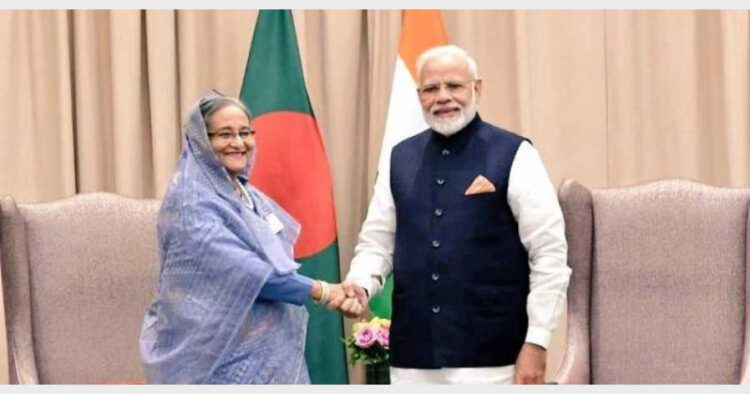New Delhi: India has certainly ‘not changed’ its position towards sharing of Teesta river water with Bangladesh. Thus the forthcoming visit of Prime Minister Narendra Modi to that country would definitely give a push for collaboration in the water resources sector.
“We will continue our cooperation in the water resources sector. It is an important area of collaboration between the two countries,” Foreign Secretary Harsh Vardhan Shringla told reporters in the run-up to Modi’s visit to the country commencing Friday, March 26.
Last week, both sides agreed to expand cooperation on issues relating to water resources during the water resources secretary-level meeting. There was extensive discussion on all the 56 rivers that flow between the countries.
“Of course, there are issues not just on water flows but use of water for drinking and irrigation purposes, in all areas we work closely. We will continue our cooperation there,” the foreign secretary said. Incidentally, the visit comes at a time when West Bengal is going to the polls and Mamata Banerjee herself as the Chief Minister has been objecting to the central government move.
Answering questions, the Foreign Secretary said, “There has been a commitment from our side to conclude the Teesta Agreement as early as possible. We will continue to be engaged in that endeavour. I think this is also an important aspect from our side but we should not overlook the fact that we are talking about a very large number of rivers between the two countries.”
Sharing of Teesta water has become an issue of great debate if not political row in Bangladesh’s domestic politics.
During their last virtual summit in December 2020, Bangladesh Prime Minister Sheikh Hasina had raised the matter with PM Modi as it has become a contentious issue in Dhaka’s domestic politics as well.
During a trip to Dhaka on March 5, External Affairs Minister Dr S Jaishankar had said India’s position on sharing Teesta river water “has not changed”.
The 315 km long Teesta river rises in the eastern Himalayas, flows through the Indian states of Sikkim and West Bengal through Bangladesh before entering into the Bay of Bengal. Of course, it joins the Jamuna River at Fulchhari in Bangladesh.
The river also flows through North Sikkim, East Sikkim, Kalimpong district, Darjeeling District, Jalpaiguri District and the cities of Rangpo, Jalpaiguri and Mekhliganj.
The Foreign Secretary also said, “Security and defence is an important part of our cooperation with Bangladesh. We have in recent years signed an agreement on defence cooperation with Bangladesh”.
“We have excellent defence cooperation between our countries. As we go along, we will continue to add more and more depth and momentum to that relationship,” Shringla said.
Shringla said the visit comes at a momentous time when Bangladesh is celebrating the 50th year of its independence – an achievement which India had helped it attain. “Both countries are also observing 50 years of establishing bilateral relationships between two countries,” he said.
Reports from Bangladesh say Prime Minister Modi is scheduled to visit Jashoreshwari Kali Temple at Ishwaripur village in Shyamnagar, Satkhira.
This temple was originally built in the 12th century. It was later renovated by Lakshman Sen in the 13th century and Raja Pratapaditya rebuilt the temple in the 16th century.
The temple is one of the 51 Shakti Peeths, as per Hindu mythology.
Modi is also likely to visit the sacred shrine of ‘Matua’ community at Orakandi in Gopalganj district.
Both the countries share the commonality of history, geography, language and culture. The resolution of the land boundary has been a major achievement in the recent past.
High level meetings and visits by Prime Ministers from both sides including Hasina and Dr Manmohan Singh and Narendra Modi have taken place during the last decade.
Both sides also have stepped up efforts to improve road connectivity between the two countries.














Comments